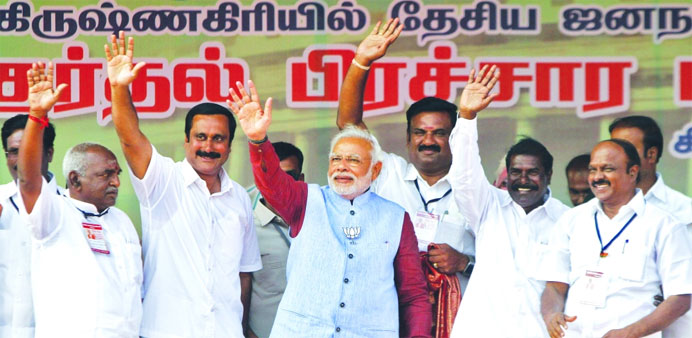Narendra Modi waves to his supporters during a public meeting at Krishnagiri in the southern state of Tamil Nadu yesterday.
Agencies/New Delhi
The Bharatiya Janata Party’s prime ministerial candidate Narendra Modi yesterday accused the media of smearing him over sectarian rioting in 2002 in which more than 1,000 people, mostly Muslims, died.
The BJP is on track to win India’s general election and promote Modi from his current post as chief minister in Gujarat - his home state where the rioting occurred - to become the next prime minister.
Voting in the world’s largest democracy is phased over several weeks, beginning on April 7 and ending on May 12. Results are due to be announced on May 16.
“If the media had not made such an effort to malign Modi, Modi would not be as well known as he is,” the 63-year-old politician, said in an interview with the ANI television service.
Modi’s rise has drawn fresh attention to the riots. Ruling Congress Party vice president Rahul Gandhi has said that, even though a Supreme Court inquiry found that Modi had no case to answer, it did not absolve him of responsibility.
Modi has also faced accusations that he has been reticent over the killings because expressing contrition might alienate the BJP’s core Hindu vote in the five-week election. The biggest round of voting will be held today.
Modi said that his attempts to explain the 2002 events to journalists had proved futile.
“There is no top journalist to whom I have not given an interview. I answered every question from 2002-2007,” he said. “Later I saw that this was not an attempt to learn the truth.”
He expressed confidence that the BJP would achieve its best ever result in the election, while the Congress faced its worst ever defeat.
“I have said what I had to say,” said Modi. “Now I am in the people’s court, and I am waiting to hear its judgment.”
Modi also said he was committed to a policy of no first use of nuclear weapons, seeking to assuage concern after BJP vowed to revise the nuclear doctrine if elected to power.
India declared itself a nuclear weapons state after carrying out tests in the summer of 1998, which were followed by tests by Pakistan. Since then both have been developing nuclear weapons and testing longer range missiles.
“It is necessary to be powerful - not to suppress anyone, but for our own protection,” Modi said in the interview.
But he said he would pursue a policy of continuity based on the approach of former BJP prime minister Atal Behari Vajpayee who declared a policy of no first use of nuclear weapons after ordering the tests.
“No first use was a great initiative of Atal Bihari Vajpayee - there is no compromise on that. We are very clear. No first use is a reflection of our cultural inheritance,” Modi told ANI.
His comments came a week after the BJP unveiled its manifesto, pledging to review the nuclear doctrine, whose two main pillars were a no first-use commitment and building a credible but minimum nuclear arsenal.
The pledge, to “study in detail India’s nuclear doctrine, and revise and update it, to make it relevant to challenges of current times,” gave no specifics but raised concerns among former US diplomats that the policy of no first use would be abandoned. The State Department itself declined to comment.
Two sources involved in the drafting of the manifesto said the party wanted to reconsider the no first use policy in the wake of advances made by Pakistan in the area of tactical nuclear weapons.
Pakistan does not have a no first policy and is building nuclear weapons programme designed to deter India and neutralise its much larger conventional military.
India also has concerns about China, which has bigger military as well as more advanced strategic weapons arsenal. Some members of the strategic establishment said it had been 10 years since the doctrine had been released and it was time to revisit it.
According to the latest opinion poll the BJP may secure a simple majority in parliament, allowing it greater room in decision-making.

